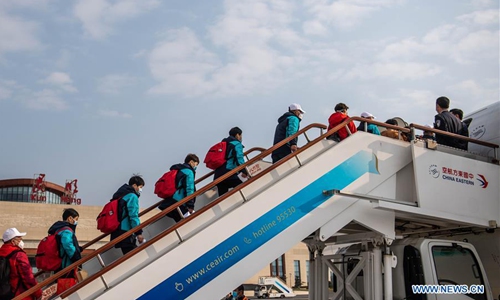HOME >> OPINION
Now is the time for Western media to learn about collectivism
By Wang Wenwen Source:Global Times Published: 2020/2/17 13:41:25

Medical team members board the flight to Hubei Province at Changshui International Airport in Kunming, capital of southwest China's Yunnan Province, Feb. 16, 2020. The fifth batch of 108 medical workers from Yunnan left for Hubei Province on Sunday to aid the novel coronavirus control efforts there. (Xinhua/Hu Chao)
China's battle against the novel coronavirus (COVID-19) outbreak that started in Wuhan, Central China's Hubei Province, continues onward. As the nation adheres to government-initiated measures like self-quarantines and community, even city, lockdowns in efforts to prevent the virus from spreading, Western media has been quick to blame the Chinese system and its governance approach.
Such criticism is all too familiar as Western media continues to ignore China's development path along with the differences and idiosyncrasies in both societies. One difference is the principle of shared responsibility and how it has resulted in the level of collectivism found within today's Chinese society.
The outbreak was sudden. Relevant officials have been held accountable, and the country has endured heavy losses. But the battle will continue before the virus is contained, and will require effort from all members of society - a consensus held by all Chinese.
Western media has taken a satirical tone when reporting on the Chinese government's mass mobilization capabilities. Many have failed to understand why the government mobilized millions of people in such a short period and why almost everyone cooperated. The underlying reason is that Chinese culture is collectivist, and such unity strengthens the ability to collaborate and contribute to large-scale movements with greater efficiency. The concept is the polar opposite of what Western society has always been advocating - individualism.
It is because of collectivism that the Chinese feel like they are part of something much bigger. In a rarely seen article, Bloomberg acknowledged that "the idea of sacrificing one's self for a greater, national goal is deeply-embedded in Chinese culture." This culture emphasizes the needs and goals of people as a whole over the needs and desires of each and every individual. So, we see the Chinese public's endurance during the outbreak - they sacrifice their freedom of movement and suffer personal inconveniences in exchange for a quick end to the fight against the virus.
Such sacrifices are not only good for an individual, but also benefit others and the entire country. In the fight against the virus, the Chinese have instinctively placed social harmony above personal preferences.
It is also because of this sense of collectivism that Chinese society has maintained order, despite large-scale quarantine and lockdown measures. Even at the epicenter of Wuhan, where stricter measures have been imposed, society continues to function normally and local people have not resorted to panic buying. This reveals public confidence in the Chinese system. Public opinion also encourages people to abide by the measures, and if they don't, they will be singled out and punished in accordance with relevant rules and regulations.
Western arguments against China's mass mobilization tend to focus on personal inconvenience caused by tough government measures. In a collectivist society, personal inconvenience does not carry the same weight as it does in an individualistic society. Therefore, criticism aimed at China's cautious measures has gained little traction outside of the West. In regions like East Asia, Africa, and Central America, the collectivist spirit is embraced.
For decades, mass mobilization has been a key advantage of the Chinese system. It has accompanied the Communist Party of China through revolution, state-building, as well as reforms and opening-up.
Mass mobilization is a process where groups with diverse interests seek a common goal. Past efforts have reinforced a sense of collectivism among Chinese, and this time, it is a driving force behind the country's mobilization efforts while combating the outbreak. Western societies are operating without mobilization traditions. When a public health crisis occurs, mass mobilization is an essential method of China's modern governance.
In a Time magazine article, columnist Jeffery Kluger said that while pandemics "will always be characterized by their randomness, pitilessness, and power to sicken and kill, the human response, when it's at its best, is defined by collective courage and compassion."
Kluger was referring to transnational infectious diseases and called for international efforts amid COVID-19. Within China's borders, the Chinese have shown collective courage and compassion. Would it be unreasonable for Western media to contribute more by adhering to the same principles?
The author is a reporter with the Global Times. wangwenwen@globaltimes.com.cn
Posted in: VIEWPOINT